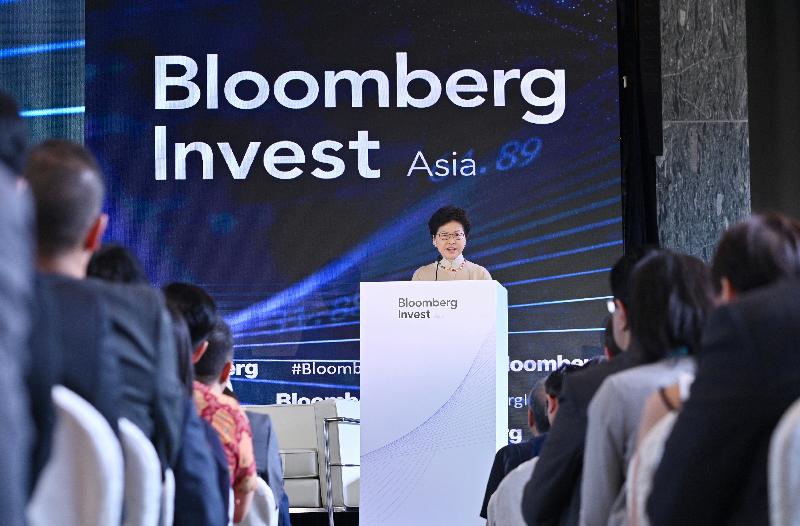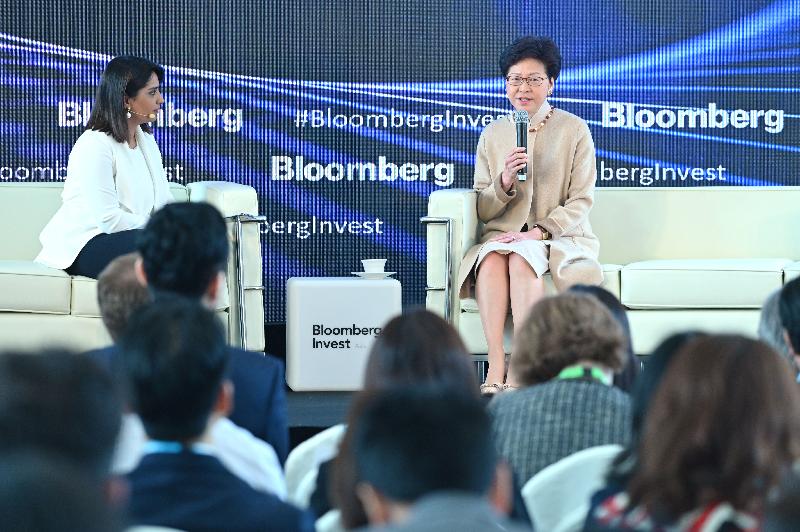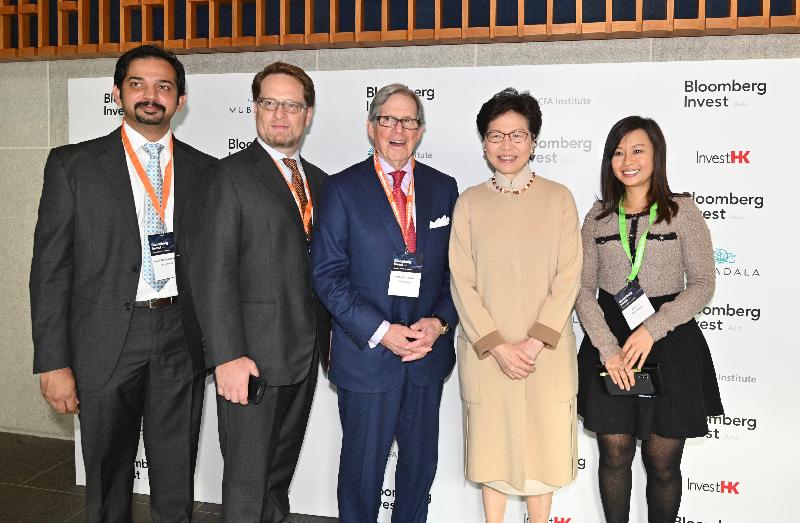Following is the speech by the Chief Executive, Mrs Carrie Lam, at the Bloomberg Invest Asia Summit today (March 21):
Peter (Chairman of Bloomberg, Mr Peter Grauer), Parry (President and Managing Director of Bloomberg Media International, Mr Parry Ravindranathan), Fion (Hong Kong Bureau Chief of Bloomberg, Ms Fion Li), ladies and gentlemen,
Good morning. Thank you for inviting me to return to Bloomberg Invest Asia for a second time as the Chief Executive. It is a pleasure to see Peter again after our last encounter on the cold mountains of Davos attending this year's World Economic Forum (WEF). Let me take this opportunity to thank him again for taking part at a breakfast meeting hosted by Hong Kong Exchanges and Clearing (HKEX) during WEF and sharing some of his insights about the world economy.
The global economy is inevitably facing considerable uncertainties caused notably by the protracted trade dispute between the United States and China, impasse over Brexit as well as other events. In January, the IMF (International Monetary Fund) revised downward the 2019 global growth forecast to 3.5 per cent. And in OECD (Organisation for Economic Co-operation and Development)'s latest interim economic outlook report published earlier this month, it predicted that the world economy would grow by 3.3 per cent in 2019, a downward adjustment of 0.2 percentage points compared to its last forecast in November 2018.
For Hong Kong, we expect our real GDP to expand by 2 to 3 per cent this year, following 3 per cent growth in 2018 and 3.8 per cent growth in 2017. Of course we would love to see a better-than-expected growth, amid the recent encouraging signs that the US-China trade negotiations are heading to an amicable outcome. However, we know that, trade issues aside, there are other deep-seated differences between China and the United States. These will not be easy to resolve, certainly not in the short term. And whether Hong Kong, a Special Administrative Region (SAR) of the People's Republic of China enjoying a high degree of autonomy, will suffer further collateral damage is yet to be seen.
But what is clear to me is Hong Kong, this vibrant economy rated as the world's freest economy by the Heritage Foundation 25 years in a row, second most competitive economy by the International Institute for Management Development and fourth easiest place to do business by the World Bank, is again displaying her resilience and can-do spirit to turn challenges into opportunities. Why do I say this? This is because amidst those difficulties and uncertainties in the West, many people and investors are increasingly looking to the East. Possessing unique strengths under "one country, two systems" and essential assets such as the rule of law, the independence of the judiciary, strong professional services, clean and efficient government, etc, Hong Kong is Asia's world city. In overseas promotions targeting businesses in other parts of the world, we deploy the tag line "Think Asia, Think Hong Kong", whereas if we are talking to businesses in Asia venturing to connect with the West, we say "Think Global, Think Hong Kong". For several decades, Hong Kong is good at connecting economies, companies, people and ideas. Hong Kong has long been the multilevel bridge between Mainland China and the rest of the world, creating the connections that reward commitment, creativity and effort, and connections that help us all excel.
Our ability to leverage on our strengths and our international connectivity has enabled us to excel in a major national strategic initiative – the Guangdong-Hong Kong-Macao Greater Bay Area that Peter has put a spotlight on in his address, highlighting the vast economic growth opportunities it presents for Hong Kong, Macao and the nine Guangdong cities that make up this ambitious city cluster of 70 million people and a combined GDP of some US$1.6 trillion. I am pleased to say that work on the Greater Bay Area is progressing well, and progressing fast. For example:
(a) An ambitious Outline Development Plan was promulgated by the Central Government on February 18, 2019;
(b) A high-level Leading Group chaired by Vice Premier Han Zheng was set up last year to provide overall steer and effective co-ordination, and for the first time, the Chief Executives of the Hong Kong SAR and the Macao SAR are members of this central leadership group. The Leading Group has already met twice, giving clear indications and directions on a range of issues, notably the development of an international innovation and technology hub in the Greater Bay Area;
(c) Tangible measures have been rolled out to facilitate free flow of people, goods, capital, etc in the Greater Bay Area, including two tax measures much welcomed by the people of Hong Kong; and
(d) There has been growing interest abroad about the Greater Bay Area which has prompted the three governments to conduct joint promotions overseas, with the first destination being Tokyo, Japan, next month.
The Greater Bay Area will certainly bring new opportunities to the region and provide Hong Kong with new impetus to grow her economy and improve people's livelihood.
Peter has, in his opening remarks, portrayed "a new investing age" for investors and aptly provided the advice that investors should look into new markets, new technologies and new approaches in order to seize the many opportunities. The Hong Kong SAR Government is committed to enhancing the business and investment environment for all and to do so, I have advocated also three "new"s – a new style of governance, created new roles for government and adopted a new fiscal philosophy. Let me briefly illustrate these in our efforts to enhance our financial services industry.
Hong Kong is ranked the world's number three in the latest Global Financial Centres Index. We are the world's largest offshore RMB centre. Funds raised through initial public offerings (IPOs) came first in the world for six out of the past 10 years, including last year at a total of US$36.5 billion raised through IPOs. Under a new proactive style of governance, I set up a Financial Leaders Forum in 2017, shortly after taking office, chaired by the Financial Secretary to take a visionary view of Hong Kong's financial services development and put in place practical policy measures to support the industry. These include enhancing our listing regime to accommodate the emerging and innovative companies with weighted voting rights and pre-revenue biotechnology businesses, expediting the use of Fintech with the introduction of the Faster Payment System now serving over 2 million customers and the issue of virtual banking licences shortly, growing the bond market with a pilot bond grant scheme and promoting green finance through a government green bond programme and subsidies for qualified green bond issuers. In introducing these new measures, we are mindful of ensuring adequate investor protection, monetary stability as well as market consultation and transparency.
We are fully aware of the potential of the emerging Asia and to tap that potential, the Hong Kong SAR Government has to adopt some new roles. Apart from being a public service provider and a regulator, I have required my government bureaux and departments to also perform the role of a facilitator and a promoter. One aspect of work that stands out in the past 20 months under this guidance is the emphasis we put on government-to-government co-operation, and entering into multilateral and bilateral agreements to provide a better operating environment for businesses and professionals. These include a total of five Free Trade Agreements signed or concluded, including one with the 10 member nations of ASEAN (Association of Southeast Asian Nations) and one with Australia. These also include Comprehensive Double Taxation Agreements, Investment Promotion and Protection Agreements, mutual recognition of funds, and expansion in our international network. Just over three weeks ago, I was in Bangkok, and this was my third trip To Bangkok after taking office, for the formal opening of our Economic and Trade Office there, our 13th overseas office and third in ASEAN. That speaks of the importance my Government places on ASEAN. We have plans to set up similar new offices in Dubai, Moscow, Mumbai and Seoul.
My new fiscal philosophy aims at wisely using our accumulated surpluses to invest for Hong Kong's future and to increase Hong Kong's competitiveness. Since taking office, I have allocated over US$1 billion recurrent expenditure for education and committed some US$13 billion expenditure for innovation and technology. While maintaining a simple tax system, we have rolled out two tax concessions from the current fiscal year, with the introduction of a two-tiered profits tax lowering the tax rate to only 8.25 per cent for the first HK$2 million of profits, and a super tax deduction to incentivise private businesses' investment in research and development. Also starting from April this year, different types of onshore and offshore funds meeting certain conditions will be eligible for profits tax exemption. And the Financial Secretary is studying the case of introducing a more competitive tax environment to attract private equity funds to set up and operate in Hong Kong. Hong Kong's asset management industry was already managing a total asset value of US$3.1 trillion in 2017 but I believe Hong Kong enjoys an unparalleled edge in further developing the asset management business.
Hong Kong's strengths in financial services are clearly recognised in the Greater Bay Area Outline Development Plan unveiled last month. The Greater Bay Area will strengthen our status as a global offshore RMB business hub and international asset and risk management centre. Coupled with our efficient links to other major commercial centres around the world, as well as our financial regulatory and supervisory framework that follows international standards, Hong Kong can help promote an efficient flow of factors of production within the Greater Bay Area to support the development of the real economy. The new roles and initiatives I have mentioned will help Hong Kong seize the many opportunities arising from the Greater Bay Area.
In my opinion, the key to the success of the Greater Bay Area will be in working together, in complementing our respective strengths. Certainly, the market size of the Greater Bay Area and its advanced and comprehensive industrial system offers much for Hong Kong businesses. At the same time, Hong Kong has much to offer to the Greater Bay Area. Hong Kong is a global city, free and open to business, with world-class strengths in financial and professional services and a legal system rooted in the rule of law. Above all, we have the unique advantage under the "one country, two systems" framework, a framework that shapes our relations with the Mainland and the world.
Beyond financial services, the Plan recognises Hong Kong's strengths as well in trade and transport, research and technology, and aviation. As an international aviation hub, Hong Kong International Airport last year handled a record-breaking 74 million passengers and 5.1 million tonnes of cargo and air mail. The airport's three-runway system, now under construction, will further strengthen connections between Hong Kong, the Mainland and the world. Meanwhile, with the timely commissioning of the high-speed train and the Hong Kong-Zhuhai-Macao Bridge last year, land-based connectivity between Hong Kong and the Greater Bay Area Mainland cities as well as Macao has been strengthened.
Ladies and gentlemen, as Peter has suggested, I could continue to speak for hours on the Greater Bay Area development, but I guess it is better for me to stop here to allow some time for the discussion with Mallika. Allow me to conclude by saying that Hong Kong is going to play an important role in the Greater Bay Area development, and I am confident that the development is going to bring enormous opportunities to Hong Kong and all those who choose to partner with us. We welcome you all to join us.
I wish you all the best of business at today's Bloomberg Invest Asia, and throughout this year of challenges and opportunities. Thank you very much.
Follow this news feed: East Asia








